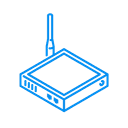Alarm sensor connected to Sonoff 433 RF Bridge
Alarm sensor connected to Sonoff 433 RF Bridge via eWelink REST API Server.
Alarm sensor connected to Sonoff 433 RF Bridge
This Enapter Blueprint enables support of different alarm sensors connected to Sonoff 433 RF Bridge in Enapter Cloud via eWelink REST API.
Installation Guide
View on GithubThis Enapter Device Blueprint integrates an Alarm sensor connected to Sonoff RF Bridge via eWelink REST API Server. The Blueprint is running on Enapter Virtual UCM.
If you have more than one alarm (like in this blueprint) you should create as many vUCMS as a number of your alarms and upload this blueprint to every vUCM.
Requirements
-
eWelink account
You require to have email and password used for login as well as region.
The eWelink account can be created in the eWelink Mobile App.
-
Sonoff Device ID You can find it in the eWelink app:
-
Tap on Device.
-
Click ... in top right corner.

-
Scroll down to Device ID. Write it down for future use.

-
-
Latest version of Enapter Gateway Software
Enapter Gateway Software must support Virtual UCM and Docker containers runtime.
Running eWelink REST API Server
This Blueprint is using eWelink REST API Server. For more details visit its page at GitHub and Docker Hub
At the moment of writing the instruction the original eWelink REST API server has no support for several channel devices but you can get a patch.
The REST API is an intermediate service which from one side connects to eWelink client API (for example eWelink mobile application) and on the other side provides HTTP endpoint where you can get data of your devices in JSON format or execute commands for switches.
The beauty of this solution is a possibility to use Enapter Energy Management toolkit and exisitng eWelink service.
In this example we will build our own container.
-
Clone repository
git clone https://github.com/nkrasko/Ewelink-Rest-Api-Server cd Ewelink-Rest-Api-Server -
Build container
docker build -t nkrasko/ewelink-rest-api-server -f ./docker/Dockerfile . -
Run docker container
docker run -d --restart unless-stopped \ -p LOCAL_TCP_PORT:3000 \ -e 'EWELINK_USERNAME=EMAIL' \ -e 'EWELINK_PASSWORD=PASSWORD' \ -e 'EWELINK_REGION=REGION' \ -e 'SERVER_MODE=dev' \ nkrasko/ewelink-rest-api-serverPut the correct values for:
- EMAIL - your eWelink email, for example, test@test.com
- PASSWORD - your eWelink password
- REGION - your eWelink Region:
- Mainland China: CN
- Asia: AS
- Americas: US
- Europe: EU
- LOCAL_TCP_PORT: any free TCP port on which HTTP server will be listening. This port will be needed for Virtual UCM configuration in next steps. For example, 8081.
-
Check docker container is up and healthy by running command:
docker psYou should see something like:
CONTAINER ID IMAGE COMMAND CREATED STATUS PORTS NAMES 6261c5dd833f nkrasko/ewelink-rest-api-server "docker-entrypoint.s…" 33 minutes ago Up 33 minutes 0.0.0.0:8081->3000/tcp hungry_lewin
In above example, the docker container is running on TCP port 8081.
-
Check your API provides valid response with CURL from host where docker container runs:
curl http://127.0.0.1:8081You should get valid JSON as response.
If everything is fine you are ready to connect your device to Enapter Cloud!
Connect to Enapter
-
Sign up to the Enapter Cloud using the Web or mobile app (iOS, Android).
-
Use the Enapter Gateway to run the Virtual UCM. If you are running eWelink REST API server on diiferent computer, ensure it is available from the Enapter Gateway.
-
Create the Enapter Virtual UCM.
-
Upload thie Blueprint using Enapter Marketplace on your mobile device. Advanced users can upload using Web IDE or CLI by following Developer Documentation.
-
As soon as Blueprint will start the Module Not Configured event will be triggered.
-
Navigate to Settings (
 ).
). -
Click Commands.
-
In the Settings section of the Commands screen click on Main Configuration command in the Enapter mobile or Web app to set main settings for your Virtual UCM:

You need to set the following parameters you got during previous steps:
-
IP Address of eWelink REST API server;
-
IP Port;
-
Device ID;
-
Remote Number.
-
-
Press Run button
The status data should be available on your Alarm sensor connected to Sonoff RF Bridge dashboard.
References
Runs on
